As the dry season tightened its grip over Tsavo and rain filled waterholes dried out, yet again the wild elephants and our own ex-orphans began drinking on a daily basis at both the mudbath water trough and the one at the Ithumba Stockades
As the dry season tightened its grip over Tsavo and rain filled waterholes dried out, yet again the wild elephants and our own ex-orphans began drinking on a daily basis at both the mudbath water trough and the one at the Ithumba Stockades. The poaching of elephants for their ivory has escalated sharply during the last weeks, not just in Tsavo, but in Kenya generally. The poaching fraternity all seemed bent on trying to make a mercenary killing from what ivory they could get pending the signing into law of more stringent poaching punishments, about which there has been a lot of publicity of late.
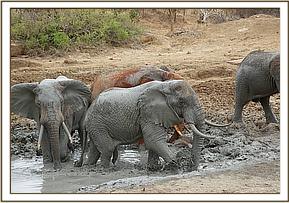

Almost daily reports of arrowed elephants began coming in from all over the Tsavo ecosystem as did others about elephants incapacitated by cable snares. The Tsavo KWS/DSWT Mobile veterinary unit had its hands full, sometimes called upon to treat as many as 3 wounded elephants every day. The one positive factor in all this has been that almost all the elephants treated have made a full recovery, and we have put that down to the magic healing properties of Green Clay, which is fossilized seaweed from the Massif Centrale in France.
On the 27th July 2013, unusually no wild elephants turned up to drink at the Ithumba Stockade water trough until Mulika accompanied by some of the ex-orphans and three wild companions arrived in a rush, all visibly nervous. Upon closer inspection the Keepers noticed that Mulika had a cut along her lower abdomen which, they surmised, might have been caused by a sharp stick since it did not look threatening at the time. She and her friends snatched a quick drink and then left. The matter was reported to the DSWT HQ in Nairobi and relayed to the KWS authorities as well who were urged to send more rangers to the area to deal with the increased presence of poachers while the Trust also dispatched a second anti-poaching team to reinforce the one already there.
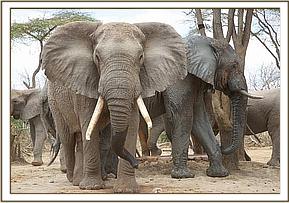

The very next day, Napasha, Kora, Naserian, Lualeni and Chyulu were amongst 25 wild elephants who came to drink at the Stockades in the morning, followed later by Yatta and some of the other ex-orphans, minus Challa, Mulika, her calf Mwende, Galana, Meibai, and Kenze. Unusually, none of the ex-orphans or any other wild elephants joined the Keeper Dependent Juniors at the mudbath venue that day, but that evening ex-orphan Challa who was amongst the other ex-orphans who came to drink at the Stockades, had a poisoned arrow protruding from his face! The Keepers were able to pull out the shaft, but the arrowhead remained imbedded, so clearly this was yet another case for Dr Poghorn, the KWS vet attached to the DSWT funded Tsavo Mobile Veterinary Unit. The Keepers also noticed that some sepsis had appeared on Mulika’s stomach cut, so they took the precaution of enclosing both Challa and Mulika (along with her calf, Mwende) in one of the Stockades to await the arrival of the vet who was driving up from Voi.
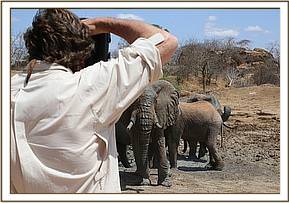

Upon the vet’s arrival both elephants were immobilized. It was a relatively simple procedure to remove the arrowhead from Challa’s face, but it transpired that Mulika’s wound, which the Keepers thought was just a glancing cut, turned out to be much more serious. The arrow had penetrated deep but fortunately had bounced off a rib; otherwise it would have been fatal. After much probing deep inside her body, the arrow was found and removed, and both elephants were given a long acting antibiotic injection before being revived.
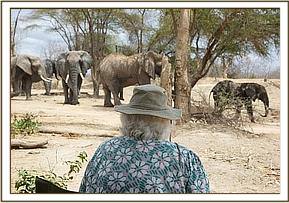

By mid-August the Keepers reported that Mulika had developed a large swelling beneath her belly, which the vet felt needed to be drained. Added to that, 13 year old ex-orphan Galana had returned with a fresh arrow wound in her side, as had the wild bull “Pembe Moja” who comes regularly to drink at the Stockade water trough. Yet again, Dr Poghorn was needed at Ithumba but having waited at the Stockades for 3 days for the ex-orphans to put in another appearance, he had to leave to treat other cases but not before having treated ‘Pembe Moja’.
On the 15th August Dr Poghon was able to return and perform these operations close to the Orphans’ mudbath venue. All the ex-orphans came to drink that day accompanied, as they often are, by friendly big wild bulls who, taking their cue from our orphans, have become amazingly relaxed in the company of the Keepers and visitors both at the stockade compound, and also at the mudbath venue. Amongst them on this day was the big tusker called “Mshale”- whose life we have been able to save on two previous occasions by removing poisoned arrows from his body. This time he had a suspicious looking wound near his shoulder which could be yet another arrow wound.
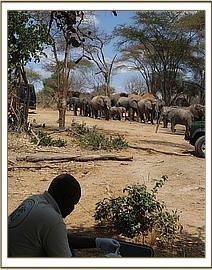

After all the elephants had milled around awaiting their turn to take water, and had moved away from the trough, Galana was singled out first as she clearly remained with a poisoned arrow embedded in her body. Galana’s operation was quick and an arrow was removed. Fortunately it had obviously entered her body at an angle, so it was not dangerously deep. Her wound was cleaned, packed with green clay and Galana was revived. All this took place with the concerned orphans looking on curiously. Mulika was then singled out by the Keepers, who kept the others at bay while she was darted. As the drug began to take effect, Dr Poghorn rushed forward to give her a shove in order to ensure that she fell on the correct side to enable him to deal with her wounds.


One of the wild big bulls, who witnessed this, was not at all happy, threatening to charge. Taru, (Angela’s son) then had to boldly drive the Landrover towards him and remain between him and the work in progress as Dr Poghorn operated on Mulika. All the other ex-orphans were deeply concerned, coming forwards to try and help their fallen comrade, whilst Yatta escorted Mulika’s baby Mwende away from the confusion along with her own baby. Sunyei let out a desperate cry of distress the moment Mulika collapsed, but even so, all had sufficient trust in their human family of Keepers to obey their tone of voice commands watching the proceedings with visible concern, crowding around a few paces away as Dr Poghorn set to work.


Mulika’s infected side was lanced and liters of pus poured onto the ground as the vet reached deep inside to remove the necrotic flesh. The effects of the poison were evident for all to see. People were rushing back and forth bringing water with which to wash out the wound, which was then packed with a huge quantity of green clay made into a paste with a small exit hole left open to allow for further drainage. Mulika was then revived, and once up on her feet again, was surrounded and comforted by the loving touch of many trunks, sandwiched between her peers, before being escorted off to be reunited with her calf who had remained under Yatta’s supervision.
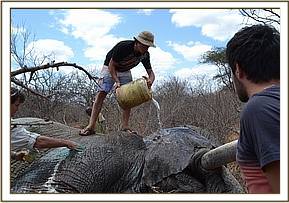

Attention now turned to the big tusker, “Mshale” who was wandering away from the drinking trough at the time, the tractor having been summoned to be at hand should he need to be turned over in case he fell on the wrong side. The moment the immobilizing dart struck Mshale in the rump, he ran off at speed. A search through the dense bush then ensued to establish where he had fallen, which turned out to be not terribly far away. There he lay like a red mountain, dwarfing the men that surged around his huge recumbent body as the vet investigated the wound. Fortunately the wound was on the upside of his body. Also very fortunately, no arrow head was imbedded, so Mshale was revived, having had the visibly infected wound anointed with the magic green clay.
Since then, the ex-orphans have been returning daily and their progress closely monitored. The wounds on all these elephants, including that of Mulika, have healed in a miraculous way, with no sign whatsoever of any sepsis reappearing. In the wake of these poaching incidents within the Ithumba area in northern Tsavo East National Park, the KWS/DSWT anti-poaching teams have been reinforced with many more rangers aided by aerial support. We are happy to report that this has not been in vain, and a number of poachers have been arrested and charged since these incidents.
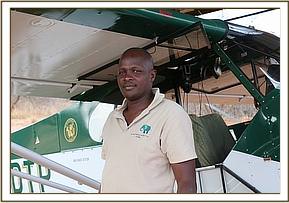

Please support this vital veterinary unit and our anti-poaching initiatives by donating through our website https://www.sheldrickwildlifetrust.org/is/donate_now.asp and help us to save Kenya’s elephants and wildlife.